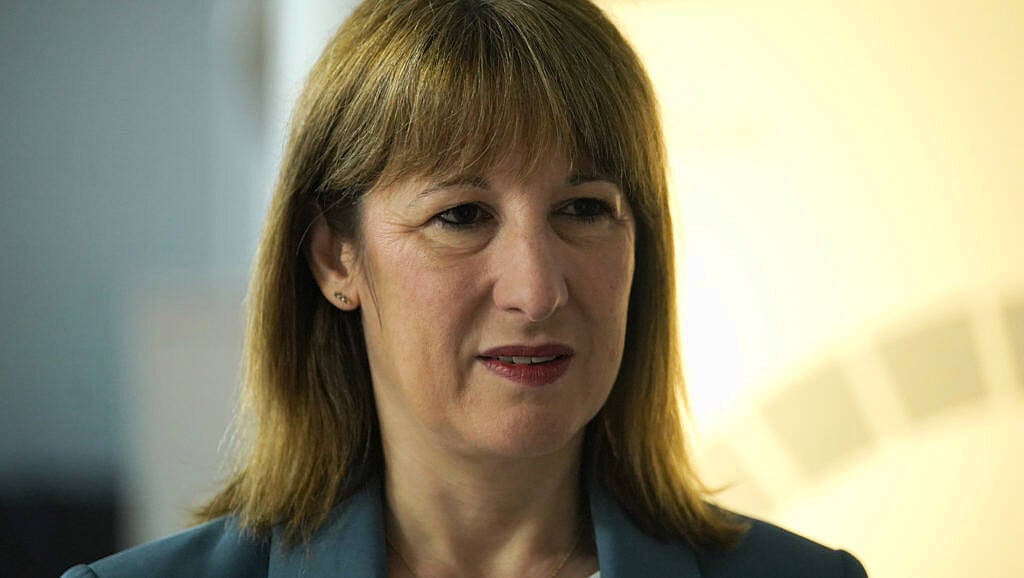Business
UK Chancellor Faces Tax Hikes to Address £51 Billion Deficit

The UK Chancellor, Rachel Reeves, is likely to raise taxes as she confronts a challenging financial landscape, with a projected £51 billion (€58 billion) black hole in public finances. The warning comes from the National Institute of Economic and Social Research (Niesr), which highlighted recent weaker-than-expected economic activity and significant borrowing that deviates from government fiscal targets.
Niesr’s latest economic outlook indicates that Reeves is on track to miss one of her fiscal rules by £41.2 billion by the fiscal year 2029-30. The think tank noted that Reeves faces an “impossible trilemma” of meeting fiscal responsibilities, adhering to spending commitments, and upholding a manifesto pledge not to raise taxes. To restore the fiscal buffer, which has fallen to just under £10 billion, Reeves must find over £51 billion.
In its analysis, Niesr stated that substantial adjustments are necessary in the upcoming October budget if Reeves hopes to comply with her fiscal rules. The report speculates on potential strategies for increasing tax revenues, including the possibility of a wealth tax, although this has been met with resistance from government officials.
Professor Stephen Millard, Niesr’s deputy director for macroeconomics, emphasized the urgency of the situation. He stated, “Things are not looking good for the Chancellor, who will need to either raise taxes or reduce spending or both in the October budget if she is to meet her fiscal rules.”
Should the UK government choose to extend the income tax threshold beyond 2028, it could potentially generate around £8.2 billion. However, this amount would fall significantly short of addressing the £51 billion deficit. Niesr suggests that to effectively fill the gap, a rise in both the basic and higher rates of income tax by five percentage points would be necessary.
As discussions unfold, the Chancellor is encouraged to consider gradual tax increases and explore reforms, such as revising council tax bands or implementing a land value tax. In a recent interview with Sky News, Lisa Nandy, the UK culture secretary, reiterated the government’s stance against introducing a wealth tax. She noted that the government was elected during a time when taxes on working people were the highest in generations and aims to reduce taxes to support citizens.
Niesr has advocated for a moderate yet sustained increase in taxes to rebuild a significant fiscal buffer. The organization believes that such measures could alleviate concerns in the bond markets regarding fiscal sustainability, which, in turn, might lower borrowing costs. This approach would also help decrease policy uncertainty, a factor that can negatively affect both business and consumer confidence.
Chancellor Reeves has established two fiscal rules: the “stability rule,” which mandates that day-to-day spending aligns with tax revenues, allowing borrowing solely for investment, and the “investment rule,” which requires a reduction in net financial debt as a share of the economy.
In response to the report, Sir Mel Stride, the shadow chancellor, criticized the government’s economic management, asserting that it has created a significant financial shortfall that will necessitate further tax increases. He stated, “Experts are warning Labour’s economic mismanagement has blown a black hole in the nation’s finances which will have to be filled with more tax rises – despite Rachel Reeves saying she wouldn’t be back for more taxes.”
On a broader economic note, Niesr has revised its growth outlook for the UK, projecting an increase of 1.3 percent for 2025, up from a previous estimate of 1.2 percent made in May. Yet, it has also lowered its growth forecast for next year to 1.2 percent, down from 1.5 percent. Niesr anticipates that inflation will be higher than previously expected, averaging around 3.5 percent in 2023 and slightly decreasing to 3 percent in the second quarter of 2026. Despite these inflationary pressures, the think tank expects the Bank of England to reduce interest rates from the current 4.25 percent to 3.5 percent by early 2026.
As the October budget approaches, all eyes will be on Chancellor Reeves as she navigates an increasingly complex economic landscape, balancing fiscal responsibility with the imperative to support the public.
-

 Top Stories3 months ago
Top Stories3 months agoTributes Surge for 9-Year-Old Leon Briody After Cancer Battle
-

 Entertainment4 months ago
Entertainment4 months agoAimee Osbourne Joins Family for Emotional Tribute to Ozzy
-

 Politics4 months ago
Politics4 months agoDanny Healy-Rae Considers Complaint After Altercation with Garda
-

 Top Stories4 months ago
Top Stories4 months agoIreland Enjoys Summer Heat as Hurricane Erin Approaches Atlantic
-

 World5 months ago
World5 months agoHawaii Commemorates 80 Years Since Hiroshima Bombing with Ceremony
-

 Top Stories3 months ago
Top Stories3 months agoNewcastle West Woman Patricia Foley Found Safe After Urgent Search
-

 Top Stories5 months ago
Top Stories5 months agoFianna Fáil TDs Urgently Consider Maire Geoghegan-Quinn for Presidency
-

 World5 months ago
World5 months agoCouple Convicted of Murdering Two-Year-Old Grandson in Wales
-

 World5 months ago
World5 months agoGaza Aid Distribution Tragedy: 20 Killed Amid Ongoing Violence
-

 World5 months ago
World5 months agoAristocrat Constance Marten and Partner Convicted of Infant Murder
-

 Top Stories4 months ago
Top Stories4 months agoClimbing Errigal: A Must-Do Summer Adventure in Donegal
-

 Top Stories4 months ago
Top Stories4 months agoHike Donegal’s Errigal Mountain NOW for Unforgettable Summer Views









